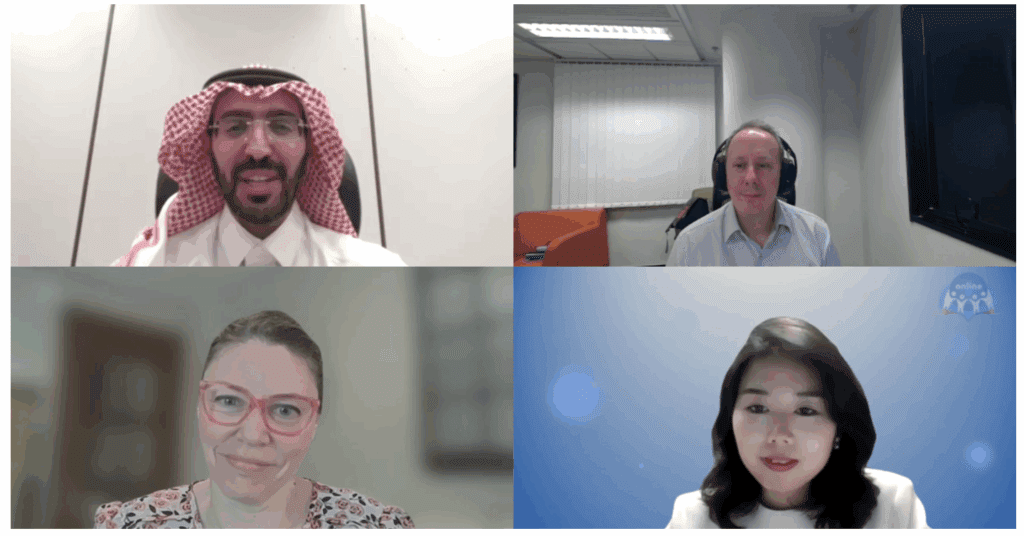“Higher Education at the Crossroads: Pioneering AI-Driven Paradigm Shifts”
Co-hosted by the Global MOOC and Online Education Alliance (GMA), Tsinghua University, XuetangX, and UNESCO International Institute for Information Technologies in Education, the second session of 2025 Online Education Dialogue (OED) was successfully held on April 24th, 2025. This session conversed about a comprehensive exploration of AI’s transformative potential, its challenges, and the strategic pathways for integrating AI-driven paradigms into the educational landscape.
Speakers for the session, including Dr. Mohammed Alzaid (Head of the Artificial Intelligence Office, King Saud University), Dr. Sean McMinn (Director of Center for Education Innovation, The Hong Kong University of Science and Technology), and Dr. Cecilia Saint-Pierre (Director of Online Education Office, University of Chile), offered their expert insights on the evolving role of AI in reshaping higher education. Hongru Li, Manager of Tsinghua University’s Online Education Center and Assistant Secretary-General of Global MOOC and Online Education Alliance, hosted the session. The dialogue was broadcast live on XuetangX, attracting a global audience of over 3,000 views.

(From left to right) First row: Mohammed Alzaid, Sean McMinn
Second row: Cecilia Saint-Pierre, Hongru Li
Mohammed Alzaid outlined King Saud University’s (KSU) transformative AI strategy in his keynote address. He highlighted KSU’s cross-disciplinary integration of AI in programs, research, and governance, emphasizing the launch of AI bachelor tracks and a mandatory first-year AI course. Since establishing the AI Office in 2023, over 450 individuals have received training. KSU now houses AI labs in all 24 colleges, with plans for a generative AI center and ethical AI frameworks to reshape pedagogy and foster innovation.
Sean McMinn delivered a keynote highlighting shifts in employer-demanded skills driven by AI adoption. He pointed out that AI adoption requires more than technical skills, stressing the rise of social-emotional competencies. Survey data showed students and faculty are underutilizing AI, over-relying on it for basic tasks. He emphasized AI-resilient assessments and the development of metacognitive skills. McMinn introduced the HKUST AI Readiness Framework, which helps universities assess AI adoption maturity and includes strategies for interdisciplinary literacy courses and faculty development.
Cecilia Saint-Pierre addressed AI’s transformative effects on education, stressing the need to adapt teaching methods. She highlighted the importance of fostering critical thinking and ethical AI literacy, given that students increasingly interact with AI tools without understanding their probabilistic and bias-prone nature. Saint-Pierre described how University of Chile trains faculty to create AI-enhanced learning experiences, using tools like AI-generated course materials and chatbots. She concluded by urging universities to focus on problem-solving and evidence-based AI implementation, preserving core competencies.
The panel discussion delved into the challenges and opportunities of integrating artificial intelligence into higher education. Alzaid shared King Saud University’s approach to AI in education, emphasizing the value of AI-guided flipped classrooms to support learning and enhance student engagement. McMinn highlighted the need for cultural change in education, advocating for assessments that focus on creativity and ethical reasoning, skills less replicable by AI. Saint-Pierre discussed the divide in AI adoption across disciplines, stressing the importance of redefining AI’s role in fostering critical inquiry, especially in the humanities.
Through thought-provoking keynote speeches and a dynamic panel discussion, the dialogue explored the integration of AI-driven technologies in higher education, their transformative possibilities, and the ethical and practical challenges they present. Speakers emphasized the necessity of balancing innovation with intentionality to leverage AI responsibly, spotlighting its capacity to enhance equity, foster adaptive learning models, and bridge cultural divides through multilingual and accessibility-focused solutions. Stay tuned for further insights in the upcoming sessions of 2025 OED.
